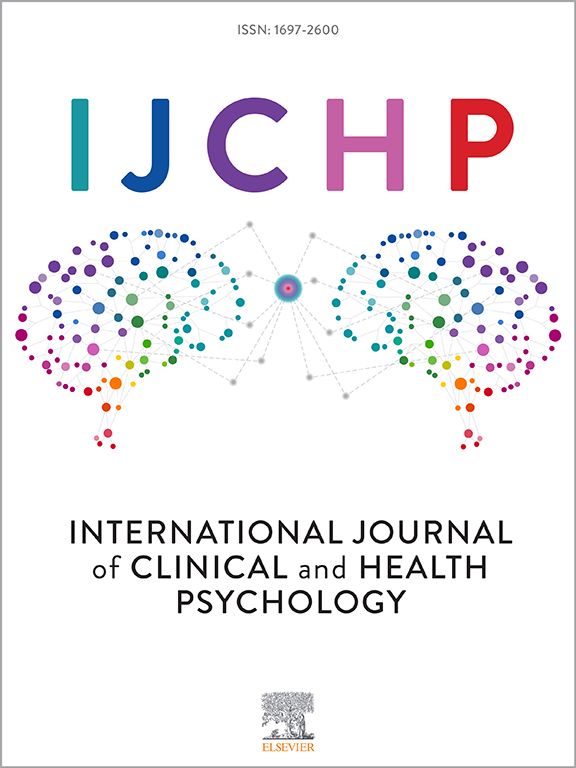Treatment of women with postpartum mental disorders in a day clinic mother-baby unit and the effect on child behavioural problems – A 1-year follow-up
IF 4.4
1区 心理学
Q1 PSYCHOLOGY, CLINICAL
International Journal of Clinical and Health Psychology
Pub Date : 2025-04-01
DOI:10.1016/j.ijchp.2025.100587
引用次数: 0
Abstract
Background
Postpartum mental disorders are highly prevalent with substantial impact on mother-child bonding and child development. While short-term benefits of an interaction-focused mother-baby treatment for maternal mental health are documented, little is known about the stability of these effects and their influence on child behavioural development.
Method
This prospective study included 348 women with postpartum mental disorders who received dyadic treatment at a specialized mother-baby day clinic. Maternal symptoms of depression (EPDS), anxiety (STAI-T), overall psychological distress (BSI-GSI) as well as parenting sense of competence (PSOC) were assessed at admission, discharge, and 1-year follow-up, along with diagnostic classification at admission. At 1-year follow-up, mothers (n = 164) completed the Child Behaviour Checklist (CBCL) to measure child behavioural problems.
Results
Maternal psychopathology and PSOC improved significantly from admission to discharge, with clinically meaningful effects. No additional improvements emerged from discharge to 1-year follow-up, except for a tentative reduction in anxiety symptoms. All outcome measures and outcome trajectories regarding anxiety symptoms and overall psychological distress varied by primary clinical diagnosis. Greater maternal symptom improvement from admission to 1-year follow-up was associated with fewer child behavioural problems. However, this effect was not found for symptom changes from admission to discharge when controlling for maternal symptoms at 1-year follow-up.
Conclusions
Interaction-focused treatment in a mother-baby day clinic may be associated with clinically meaningful improvements in maternal mental health outcomes up to 1-year follow-up. These long-term improvements may also relate to less child behavioural problems. However, the absence of a waiting list control group warrants cautious interpretation of findings.
产后精神障碍妇女在日间门诊母婴部的治疗及其对儿童行为问题的影响- 1年随访
产后精神障碍非常普遍,对母子关系和儿童发育有重大影响。虽然以互动为重点的母婴治疗对产妇心理健康的短期效益有文献记载,但对这些效果的稳定性及其对儿童行为发展的影响知之甚少。方法本前瞻性研究纳入348名产后精神障碍妇女,她们在一家专门的母婴日间诊所接受了双重治疗。在入院、出院和1年随访时评估母亲的抑郁症状(EPDS)、焦虑症状(STAI-T)、整体心理困扰症状(BSI-GSI)以及育儿能力感(PSOC),并在入院时进行诊断分类。在1年的随访中,母亲(n = 164)完成了儿童行为检查表(CBCL)来测量儿童的行为问题。结果从入院到出院,产妇精神病理和PSOC均有明显改善,临床效果显著。从出院到1年随访,除了焦虑症状暂时减轻外,没有其他改善。所有关于焦虑症状和整体心理困扰的结果测量和结果轨迹因初步临床诊断而异。从入院到1年随访,母亲症状改善程度越高,儿童行为问题越少。然而,在1年的随访中,当控制母亲症状时,从入院到出院的症状变化没有发现这种影响。结论在母婴日间诊所进行以互动为重点的治疗可能与随访1年的产妇心理健康结果的临床有意义的改善有关。这些长期的改善也可能与儿童行为问题的减少有关。然而,由于没有等候名单控制组,对研究结果的解释需要谨慎。
本文章由计算机程序翻译,如有差异,请以英文原文为准。
求助全文
约1分钟内获得全文
求助全文
来源期刊

International Journal of Clinical and Health Psychology
PSYCHOLOGY, CLINICAL-
CiteScore
10.70
自引率
5.70%
发文量
38
审稿时长
33 days
期刊介绍:
The International Journal of Clinical and Health Psychology is dedicated to publishing manuscripts with a strong emphasis on both basic and applied research, encompassing experimental, clinical, and theoretical contributions that advance the fields of Clinical and Health Psychology. With a focus on four core domains—clinical psychology and psychotherapy, psychopathology, health psychology, and clinical neurosciences—the IJCHP seeks to provide a comprehensive platform for scholarly discourse and innovation. The journal accepts Original Articles (empirical studies) and Review Articles. Manuscripts submitted to IJCHP should be original and not previously published or under consideration elsewhere. All signing authors must unanimously agree on the submitted version of the manuscript. By submitting their work, authors agree to transfer their copyrights to the Journal for the duration of the editorial process.
 求助内容:
求助内容: 应助结果提醒方式:
应助结果提醒方式:


